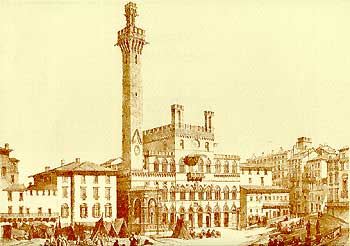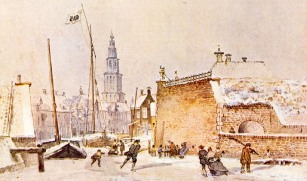|
This Winter School addresses the analysis of longitudinal, group-centered network data by way of stochastic, actor-based models (Snijders, van de Bunt & Steglich, 2010), and about the analysis of peer influence processes taking place in such dynamically changing networks (Steglich, Snijders & Pearson, 2010). It falls apart into two parts:
-
The Introductory Workshop on Monday till Wednesday introduces participants to the analysis of longitudinal, group-centered network data by way of stochastic, actor-based models (Snijders, van de Bunt & Steglich, 2010), and to the analysis of peer influence processes taking place in such dynamically changing networks (Steglich, Snijders & Pearson, 2010).
Objective of the Introductory Workshop is that course participants develop an understanding of the models, familiarise themselves with the use of the RSiena software for model estimation, and learn how to tell a good model specification from a bad one.
-
The Advanced Workshop on Thursday and Friday addresses the analysis of more complex data structures. Depending on the collective preferences of the participants, this can include multi-group data, multi-nodeset data, valued and multiplex data. Also, new technical developments on the RSiena front are discussed.
Objective of the Advanced Workshop is that course participants deepen their understanding of the models and broaden their skills to apply them to more complex data sets.
In both parts of the Winter School, researchers who bring their own longitudinal data sets should get sufficient opportunity to "get the software running" with some guidance by the instructors.
On this page you find the programme and course material of the Winter School, which will take place in Room A2 of the university's Academy Building in the city centre of Groningen (Broerstraat 5). Sessions generally start at 9:00 and end at 17:00, with an ample lunch break from 12:30-14:00. Teachers in 2015 will be Tom Snijders and Christian Steglich.
An overview of the workshop participants, with short biographical sketches, can be found here: Participants2015.pdf.
  Preparation before the course Preparation before the course 
Course participants are expected to bring their own laptop to the course, with the R
software already installed. For this purpose, please follow these instructions:
1. Install R on your computer; see http://www.r-project.org/
2. Start R while you have an internet connection.
3. Install the latest version of the RSiena package from R-forge
by typing install.packages("RSiena", repos="http://R-Forge.R-project.org")
4. Install the latest version of the RSienaTest package
by typing install.packages("RSienaTest", repos="http://R-Forge.R-project.org")
The operating system on the laptops can be Windows (32 or 64 bit), Linux, or Mac OS;
in principle, all software we will work with is designed for platform-independence.
It also is a good idea to already download the course material posted below. There will
be changes of some material, but most of it will be used as it is available now.
  Monday (Introductory Workshop, Day 1) Monday (Introductory Workshop, Day 1) 
We open around 9:00 with a walk-in welcome, at 9:15 the lessons will start.
Topics of the day:
- Overview of the course.
- Introduction to network dynamics and actor-oriented models.
- Lab: Introduction to RSiena.
- What to do in case of difficult convergence
- Differences between creation and maintenance of ties
- Rate effects
Course material for the day: slides and handouts.
  Tuesday (Introductory Workshop, Day 2) Tuesday (Introductory Workshop, Day 2) 
Course topics of the day:
- Modelling the co-evolution of networks and behaviour
- Lab exercise: co-evolution of friendship and alcohol consumption
- Time heterogeneity
- Goodness of fit
- Lab exercise: goodness of fit
Course material for the day: co-evolution slides, co-evolution lab exercise,
and goodness-of-fit slides.
On Tuesday evening, we plan a joint dinner in Humphrey's Restaurant.
  Wednesday (Introductory Workshop, Day 3) Wednesday (Introductory Workshop, Day 3) 
Course topics of the day:
- Structurally determined values
- Missing values
- Networks with changing node sets
- Two-mode (bipartite) networks & influence
- Model specification
- Lab exercise: model specification
- Positioning the actor-oriented model with respect to other network models
- Wrapping up. Obtaining help; documentation; review of the website; discussion list
- Disussion of participants' research projects
Course material for the day: slides on 'non-standard' data types, lab exercise on
bipartite influence modelling, lab exercise on multiplex network handling,
lab exercise on analysing multiple groups' networks "old style", lab exercise on
valued network handling, and lab exercise on handling composition change.
  Thursday (Advanced Workshop, Day 1) Thursday (Advanced Workshop, Day 1) 
The Advanced Workshop topics are determined based on participants' interest. The following is a list of candidate topics:
- Multiple networks
- Two-mode (bipartite) networks
- Networks with ordered values
- Signed (positive-negative) networks
- Multiple groups: meta-analysis, random coefficient multilevel network analysis (sienaBayes)
- Maximum likelihood estimation (for small groups)
- Non-directed networks.
- Networks with ordered ties.
- Diffusion of innovations.
- New effects: variations in influence
- New effects: distance-two effects
- Overview of other effects
- Effect sizes: relative important of effects
- Simulation
  Friday (Advanced Workshop, Day 2) Friday (Advanced Workshop, Day 2) 
In the morning, a Master Class will take place, in which some participants' work will be discussed.
- Master Class
- Selection from the advanced topic list (see Thursday)
- Wrapping up
  Relevant weblinks Relevant weblinks 
> Siena website and
RSiena manual
> StOCNET-RSiena User group (for discussion of applied research)
> R project webpage
> Journal of Research on Adolescence Special Issue on RSiena applications
|


